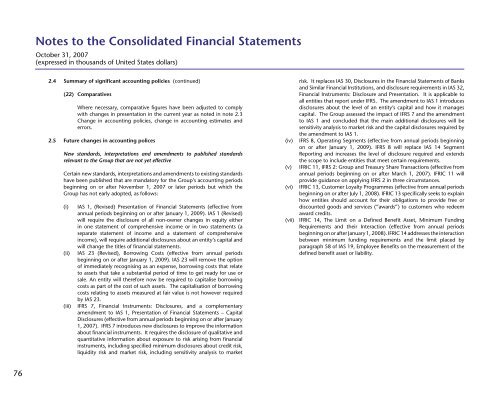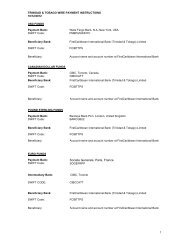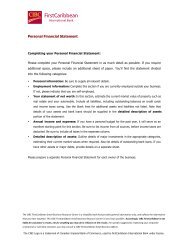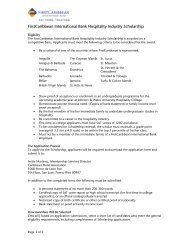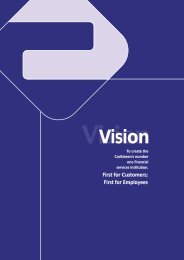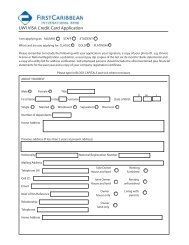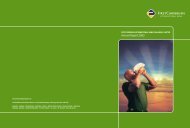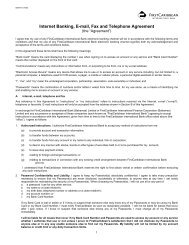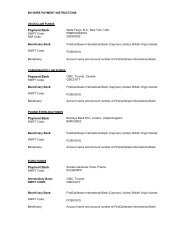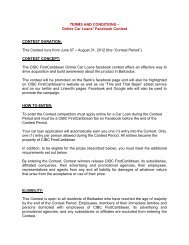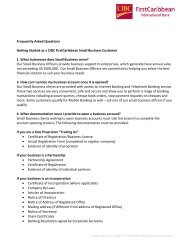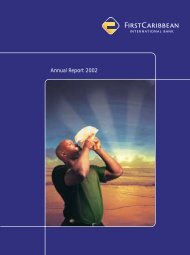Notes to the Consolidated Financial Statements - FirstCaribbean ...
Notes to the Consolidated Financial Statements - FirstCaribbean ...
Notes to the Consolidated Financial Statements - FirstCaribbean ...
You also want an ePaper? Increase the reach of your titles
YUMPU automatically turns print PDFs into web optimized ePapers that Google loves.
76<br />
<strong>Notes</strong> <strong>to</strong> <strong>the</strong> <strong>Consolidated</strong> <strong>Financial</strong> <strong>Statements</strong><br />
Oc<strong>to</strong>ber 31, 2007<br />
(expressed in thousands of United States dollars)<br />
2.4 Summary of significant accounting policies (continued)<br />
(22) Comparatives<br />
Where necessary, comparative figures have been adjusted <strong>to</strong> comply<br />
with changes in presentation in <strong>the</strong> current year as noted in note 2.3<br />
Change in accounting policies, change in accounting estimates and<br />
errors.<br />
2.5 Future changes in accounting polices<br />
New standards, interpretations and amendments <strong>to</strong> published standards<br />
relevant <strong>to</strong> <strong>the</strong> Group that are not yet effective<br />
Certain new standards, interpretations and amendments <strong>to</strong> existing standards<br />
have been published that are manda<strong>to</strong>ry for <strong>the</strong> Group’s accounting periods<br />
beginning on or after November 1, 2007 or later periods but which <strong>the</strong><br />
Group has not early adopted, as follows:<br />
(i) IAS 1, (Revised) Presentation of <strong>Financial</strong> <strong>Statements</strong> (effective from<br />
annual periods beginning on or after January 1, 2009). IAS 1 (Revised)<br />
will require <strong>the</strong> disclosure of all non-owner changes in equity ei<strong>the</strong>r<br />
in one statement of comprehensive income or in two statements (a<br />
separate statement of income and a statement of comprehensive<br />
income), will require additional disclosures about an entity’s capital and<br />
will change <strong>the</strong> titles of financial statements.<br />
(ii) IAS 23 (Revised), Borrowing Costs (effective from annual periods<br />
beginning on or after January 1, 2009). IAS 23 will remove <strong>the</strong> option<br />
of immediately recognising as an expense, borrowing costs that relate<br />
<strong>to</strong> assets that take a substantial period of time <strong>to</strong> get ready for use or<br />
sale. An entity will <strong>the</strong>refore now be required <strong>to</strong> capitalise borrowing<br />
costs as part of <strong>the</strong> cost of such assets. The capitalisation of borrowing<br />
costs relating <strong>to</strong> assets measured at fair value is not however required<br />
by IAS 23.<br />
(iii) IFRS 7, <strong>Financial</strong> Instruments: Disclosures, and a complementary<br />
amendment <strong>to</strong> IAS 1, Presentation of <strong>Financial</strong> <strong>Statements</strong> – Capital<br />
Disclosures (effective from annual periods beginning on or after January<br />
1, 2007). IFRS 7 introduces new disclosures <strong>to</strong> improve <strong>the</strong> information<br />
about financial instruments. It requires <strong>the</strong> disclosure of qualitative and<br />
quantitative information about exposure <strong>to</strong> risk arising from financial<br />
instruments, including specified minimum disclosures about credit risk,<br />
liquidity risk and market risk, including sensitivity analysis <strong>to</strong> market<br />
risk. It replaces IAS 30, Disclosures in <strong>the</strong> <strong>Financial</strong> <strong>Statements</strong> of Banks<br />
and Similar <strong>Financial</strong> Institutions, and disclosure requirements in IAS 32,<br />
<strong>Financial</strong> Instruments: Disclosure and Presentation. It is applicable <strong>to</strong><br />
all entities that report under IFRS. The amendment <strong>to</strong> IAS 1 introduces<br />
disclosures about <strong>the</strong> level of an entity’s capital and how it manages<br />
capital. The Group assessed <strong>the</strong> impact of IFRS 7 and <strong>the</strong> amendment<br />
<strong>to</strong> IAS 1 and concluded that <strong>the</strong> main additional disclosures will be<br />
sensitivity analysis <strong>to</strong> market risk and <strong>the</strong> capital disclosures required by<br />
<strong>the</strong> amendment <strong>to</strong> IAS 1.<br />
(iv) IFRS 8, Operating Segments (effective from annual periods beginning<br />
on or after January 1, 2009). IFRS 8 will replace IAS 14 Segment<br />
Reporting and increases <strong>the</strong> level of disclosure required and extends<br />
<strong>the</strong> scope <strong>to</strong> include entities that meet certain requirements.<br />
(v) IFRIC 11, IFRS 2: Group and Treasury Share Transactions (effective from<br />
annual periods beginning on or after March 1, 2007). IFRIC 11 will<br />
provide guidance on applying IFRS 2 in three circumstances.<br />
(vi) IFRIC 13, Cus<strong>to</strong>mer Loyalty Programmes (effective from annual periods<br />
beginning on or after July 1, 2008). IFRIC 13 specifically seeks <strong>to</strong> explain<br />
how entities should account for <strong>the</strong>ir obligations <strong>to</strong> provide free or<br />
discounted goods and services (“awards”) <strong>to</strong> cus<strong>to</strong>mers who redeem<br />
award credits.<br />
(vii) IFRIC 14, The Limit on a Defined Benefit Asset, Minimum Funding<br />
Requirements and <strong>the</strong>ir Interaction (effective from annual periods<br />
beginning on or after January 1, 2008). IFRIC 14 addresses <strong>the</strong> interaction<br />
between minimum funding requirements and <strong>the</strong> limit placed by<br />
paragraph 58 of IAS 19, Employee Benefits on <strong>the</strong> measurement of <strong>the</strong><br />
defined benefit asset or liability.


